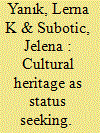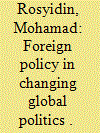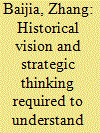|
|
|
Sort Order |
|
|
|
Items / Page
|
|
|
|
|
|
|
| Srl | Item |
| 1 |
ID:
132046


|
|
|
|
|
| Publication |
2014.
|
| Summary/Abstract |
With rapid China now the world's second-largest economy, the status and Wrole of China's think tanks have become an increasing concern. On the whole, the international status of China' s think tanks is not
commensurate with the country' s current international status. The University of Pennsylvania' s The Global Go To Think Tanks Report published in 2014 said that as of August 2013, China had 426 think tanks, second only to the U.S. with 1,828. But of the top 100 non-U.,S. think tanks in the world only 5 are Chinese, and in the 150 most in?uential global think tanks, only 6 are from China-with the rest mostly from Europe. China' s think tanks lack professionalism and in?uence.' This is why China has been pushing to improve its think tanks internationally. In April 2013, President Xi Jinping proposed building a "new think tank with Chinese characteristics". To date this has been the clearest statement from a leader of China on think tanks? Decision of the CCCPC on Some Major Issues Conceming Comprehensively Deepening the Reform was passed in the 3rd Plenary Session of the 18th CPC Central Committee held in 2013. It clearly proposed"the building of new think tanks with Chinese characteristics and developing
a sound decision-making advisory system". China' s think tanks must make an international transition, but how can they do this'? What specific challenges are there? This paper will analyze these questions.
|
|
|
|
|
|
|
|
|
|
|
|
|
|
|
|
| 2 |
ID:
181531


|
|
|
|
|
| Summary/Abstract |
This article explores the relationship between cultural heritage politics and international status-seeking. We advance a two-fold typology of status-seeking that explains why states engage in cultural heritage restoration practices at home and abroad. First, cultural heritage restoration can be an easy way to signal state respect of its multicultural past while providing cover for continuing anti-multicultural policies of the present. States with uncertain, challenged, or liminal international status use cultural heritage projects as a ‘standard of civilization’ of democracy, displaying themselves on the international stage as worthy of status and respect. Cultural heritage here is used as a strategy for international status affirmation. Second, states may engage in cultural heritage restoration beyond their borders, supporting or directly managing renovation of these sites in order to expand their imagined national cultural, political, and economic domain. Cultural heritage restoration projects here serve as a backdrop for powerful international economic alliances that can be used for status substitution—replacing one status-generating benchmark of ‘standard of civilization’ with another—economic prosperity. We illustrate these arguments with two recent cases of cultural heritage restoration that involve Turkey: the ‘Akdamar’ Church in Van, Turkey and the Tomb of Gül Baba in Budapest, Hungary.
|
|
|
|
|
|
|
|
|
|
|
|
|
|
|
|
| 3 |
ID:
154722


|
|
|
|
|
| Summary/Abstract |
Since President Jokowi came to power in October 2014, Indonesia’s foreign policy has undergone fundamental change, most obviously in the state’s emphasis on domestic priorities rather than global engagement. Although Jokowi’s foreign policy has pursued an ‘active’ principle by participating in many international forums, it seems to have overlooked the changing contexts of the geopolitical turn. Asia has been rising and is becoming the geopolitical center of gravity in the 21st century. Yet, instead of adapting to this shift, Indonesia’s foreign policy continues to neglect the ‘Asian Century’ turn that has been taking place for years. Indonesia should have increased its international profile to enhance its status as a ‘Third Asian Giant’ beside China and India, but Jokowi’s administration has not taken such an opportunity. This article argues that Indonesia is not interested in gaining international status because of the domestically focused nature of its foreign policy. Indonesia is seen as needing to consolidate its own national resilience before asserting itself in a wider international arena. For Jokowi, national interest is defined as material—primarily economic—interest. In addition, Indonesia’s traditional status as a regional, middle level international power prevents the country from seeking any greater global status. This article argues, with optimism, that Indonesia should seek to change this traditional paradigm of middle power status. It suggests that the assertion of global status matters in Indonesia’s foreign policy because the better the country’s position in the international hierarchy of states, the easier it will be for the nation to achieve its own domestic interests.
|
|
|
|
|
|
|
|
|
|
|
|
|
|
|
|
| 4 |
ID:
153424


|
|
|
|
|
| Summary/Abstract |
Focusing on ambassador appointments, the aim of this pioneering article is to address some fundamental questions about where men and women are positioned in diplomacy. Most of the gender-related diplomacy studies are limited to individual Ministry of Foreign Affairs and say little about diplomacy as an aggregate set of practices. We draw on theories of gender and positional status to ask whether there are gender patterns in ambassador appointments—with men occupying positions of higher military and economic status than women—much like the ones found in other institutions. Our analyses are based on a unique data set containing almost 7,000 ambassador appointments, made by the fifty highest ranked countries in terms of GDP in 2014. The results show that female ambassadors are less likely to occupy high-status ambassadorships than men. In short, gender patterns, linked to power and status, are present also in ambassador appointments. Diplomacy studies need to do much more to address the presence and impact of gender in international affairs.
|
|
|
|
|
|
|
|
|
|
|
|
|
|
|
|
| 5 |
ID:
130631


|
|
|
| 6 |
ID:
151183


|
|
|
| 7 |
ID:
153213


|
|
|
|
|
| Publication |
New Delhi, Pentagon Press, 2016.
|
| Description |
xii, 307p.hbk
|
| Standard Number |
9788182749405
|
|
|
|
|
|
|
|
|
|
|
|
Copies: C:1/I:0,R:0,Q:0
Circulation
| Accession# | Call# | Current Location | Status | Policy | Location |
| 059109 | 320.5/STO 059109 | Main | On Shelf | General | |
|
|
|
|
| 8 |
ID:
125016


|
|
|
|
|
| Publication |
2013.
|
| Summary/Abstract |
THE METEORIC RISE of China in its economic development has laid a good foundation for the Chinese leadership to review the international status of the country and its policies of realpolitik on the world stage. Having become a mighty economic and political power center, Beijing is actively involved in international efforts to form a new, more democratic and just multipolar world. Unlike the past, reserved player in this field, who preferred, as taught by Mao Zedong, to sit on top of the mountain to watch a fight between two tigers (the USSR and the USA), China today pursues a confident and at the same time prudent foreign policy aimed to protect its national interests and further strengthen multifaceted cooperation both with the East and the West, and seeks to actively participate in the development and implementation of what it considers appropriate solutions to topical world problems. The positive change in strategic thinking of the Chinese leadership, which is becoming increasingly more pragmatic and open-minded, has also been favorably influenced by the establishment of the Russian-Chinese strategic partnership. At the same time, in the view of Henry Kissinger, a master of American diplomacy, no other country can claim such a powerful link to its ancient past and classical principles as China. In its strategic thinking (and, one might say, in its realpolitik) Beijing, he stresses, continues to prize the virtues of subtlety, patience, and indirection over feats of martial prowess.
|
|
|
|
|
|
|
|
|
|
|
|
|
|
|
|
|
|
|
|
|